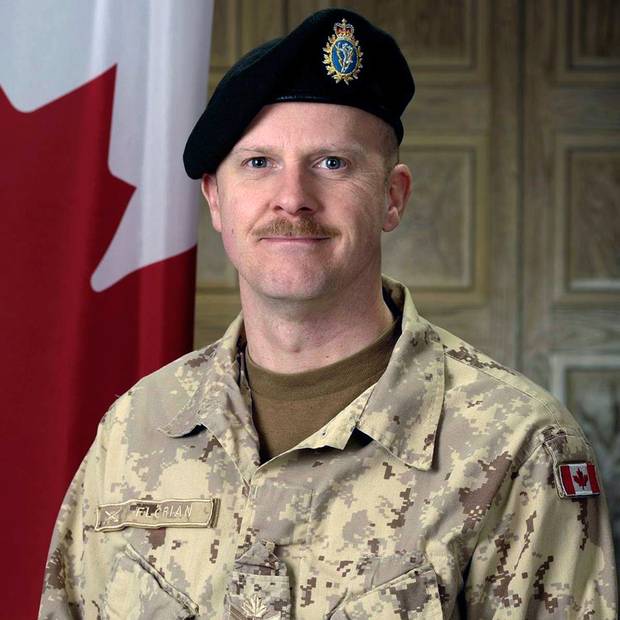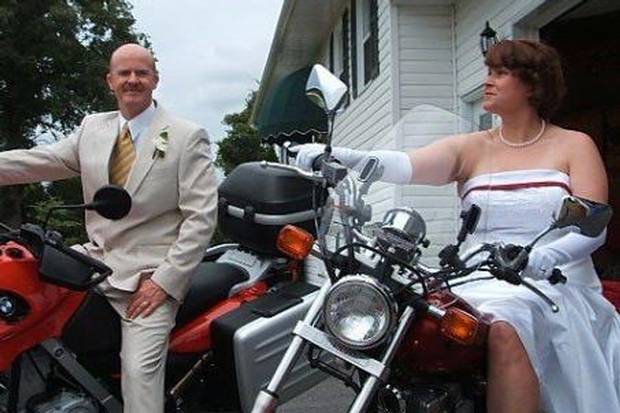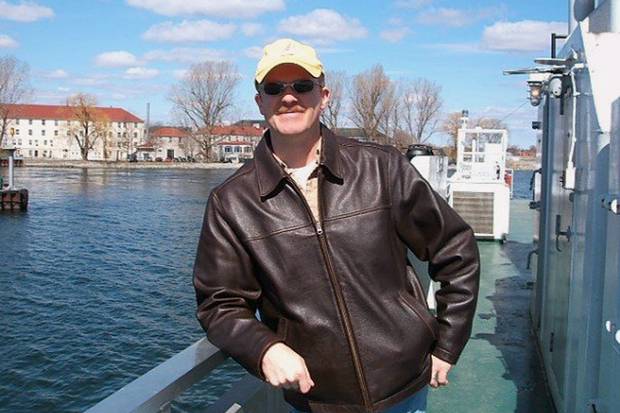This article is part of The Unremembered, a Globe and Mail investigation into soldiers and veterans who died by suicide after deployment during the Afghanistan mission.
When a soldier dies by suicide, loved ones often question the faith they had in the military and in God. This makes it all the more striking that Master Corporal A.J. Cottreau has embraced both.
MCpl. Cottreau, 46, didn't just remain with the church and the military after her husband Warrant Officer Charles Florian took his life five years ago. She threw herself with renewed energy back into her studies toward becoming a chaplain.
WO Florian was one of at least 70 Canadian soldiers who served tours of duty in Afghanistan, returned home and then took his life, according to research compiled by The Globe and Mail.

Warrant Officer Charles Florian served in a bomb-defusing unit during his final Afghanistan tour.
CANADIAN FORCES HANDOUT
On a recent warm fall day on campus at St. Paul's University in Ottawa, MCpl. Cottreau sits down on the lawn decked out in office-casual civvies, with an air-force-blue messenger bag slung over her shoulder. The only outward hint she is a soldier is the hair cut above the collar.
"I'm proud to be a soldier and it's my faith that has gotten me through it all," MCpl. Cottreau says, after wrapping up theology classes for the day.
Through a series of conversations stretching over the summer, MCpl. Cottreau tells her story with candour, humour and the occasional tear, but not one flash of anger. In our talks, she returns again and again to reframe her experience as a tool to help others.
She has a long road to travel before she has full padre status. She must complete the master of divinity she is currently working on, then spend two years training on-the-job in the Anglican Church before becoming an ordained minister. Then she has to do the military's chaplaincy boot camp. Colleagues marvel at how far she's come despite facing one of life's greatest hardships.
"What you're describing is resiliency," says Captain Judson Bridgewater, a Canadian Forces chaplain who is counted among MCpl. Cottreau's mentors. "With PTSD, suicide or other tragedies, it either strengthens faith or has the opposite effect. Negative events cause a lot of people to question. She is a great example of spiritual resiliency, of someone who in the face of tragedy is not only surviving but thriving."
Becoming a padre wasn't an epiphany that struck MCpl. Cottreau after her husband's death. With her sympathetic ear, people were always drawn to telling her their troubles. A few friends had suggested it was a logical career path in 2007 when her husband told her she'd make a perfect chaplain. At first she dismissed him. He didn't even believe in God. "Yeah, but you do, and you could really help people," he told her. She started to explore her options.

Newlyweds WO Florian and MCpl. Cottreau on July 14, 2007.
Photo courtesy Florian family
The love story
MCpl. Cottreau was a drummer working in a music store in 2001 when she met a soldier named Charles Florian. It was a week after Sept. 11 and she was reading a book on a park bench in the Halifax Public Gardens. He asked her the time. (He had a watch, he later admitted.) She blushes now describing the immediate crush: "He was just so sweet and so cute."
He was attached to HMCS Iroquois and preparing to ship for the Persian Gulf. They saw each other every day before he left and kept in touch during his deployment. "It was before e-mail was a big thing. Old-fashioned letters worked better," she says.
When he returned home in seven months, they switched from letters to dates and within a few months they had moved in together. Eleven months later, he was off on a second deployment on the Iroquois and MCpl. Cottreau decided to join up herself.
She knew the military was a good way to get an education and wanted to go back to school to take social work or psychology. She was also looking for a stable career, and it seemed the surest way to find fulfilling work while living with WO Florian was to enlist. "I didn't want to have to start over again every time we got posted somewhere new," she said.
A communications specialist, WO Florian was posted to Kingston upon his return in 2004 just as she was off to boot camp at Saint-Jean-sur-Richelieu, Que.
In 2005, WO Florian deployed for the Canadian mission to move from Camp Julien near Kabul to Kandahar. In 2009, he went back to Kandahar where he was attached to a counterexplosives unit charged with defusing bombs.
Between those tours both soldiers were posted to CFB Kingston where, for four years, they settled into the closest thing to domestic bliss military families experience. The moved to an acreage in nearby Harrowsmith, Ont., and married in the backyard in July, 2007.
In his spare time WO Florian collected radio-controlled cars and aircraft, and rode his snowmobile. She started work on an arts degree at Queen's University with an eye toward theology.

WO Florian on his snowmobile in April, 2007, at his home in Harrowsmith, Ont.
Photo courtesy Florian family
Before classes started, he set up the living room with a new desk and sofa to give her a sunny and cozy place to study. He bought her daisies to celebrate her first mark. "That was the guy I married," she recalls. "It was very sweet."
Her friends constantly told her what a catch she had with Charles. But WO Florian's second tour in Afghanistan brought an end to their domestic bliss. Serving in Kandahar province in 2009 was difficult enough, but few people had more stress than the crews dealing with roadside bombs. A captain stepped on a landmine and lost his leg. In June, WO Florian's team member Corporal Martin Dubé was killed instantly while defusing a bomb.
The death occurred as WO Florian was preparing to go home on his mid-tour leave. MCpl. Cottreau says all he wanted to do was stay in theatre with his team but the army leave schedule left him no choice.
"He wanted to be with his guys. I totally understood that," she says. "But he came home a different man. He was drinking heavily; he walked around in a rage. He never hit me but he was scary. I was walking around on eggshells. You never knew what would set him off."
He returned to Afghanistan to complete his tour but came home in November, 2009, permanently changed. "He was a stranger," MCpl. Cottreau says. "The man I married was gone."

WO Florian on the Wolfe Island, Ont., ferry in 2006.
Photo courtesy Florian family
The complete stranger
They quickly got him in to see a doctor and MCpl. Cottreau says it wasn't hard to get treatment. He had a family physician, a social worker, a psychologist and he was on medication. "Finding help was easy, the work he had to do was extremely difficult," she says. By 2010 things seemed a bit better and WO Florian went back to work teaching at the Canadian Forces School of Electronics and Communications in Kingston.
But his trauma would still surface and life as a military couple took a toll. In the spring of 2010, MCpl. Cottreau was sent to Barrie, Ont., for the G20 summit, an assignment which unexpectedly stretched into months. Afterward, she had a sudden opportunity to go to Afghanistan.
"I didn't want to leave him again to his own devices with his PTSD but he said, 'No, I want you to go, you earned it,' " she said. "He seemed okay and the thing about Charles is, he was always very supportive. So off I went. But he wasn't as good to go as I thought."
Her overseas tour was short. On her first day in Afghanistan her best friend back in Canada died of natural causes. Two weeks later, her mother died. The family had kept quiet about her mom's illness because they expected her to recover and they didn't want MCpl. Cottreau to worry. She went home immediately.
She didn't know until she got home how badly Charles had slipped during her months in Barrie and weeks in Afghanistan. He missed his mother-in-law's funeral. He got sidetracked driving from Ontario to Nova Scotia, dropping in on friends in New Brunswick. When confronted, he told her: "I can't be your crutch."
"I was just like, 'Oh my God. Here is a complete stranger.' It was horrific. Devastating," MCpl. Cottreau says. "He was just not normally that kind of person. He loved my mom. He was not that guy."
Over the next year, MCpl. Cottreau was riding waves of grief – for her friend, her mother and the husband she barely recognized. Where he used to enjoy only an occasional beer, he started pounding back alcohol. He would disappear to visit friends with whom he seemed to have a parallel life. At work, when he was able to work, he was still the popular senior non-commissioned officer who would do anything to help his troops and colleagues. "He was beloved, quite honestly. He made friends everywhere."
WO Florian was struggling but he gave no clear warning signs of imminent suicide on Sept. 3, 2011, when MCpl. Cottreau headed off to visit a friend. She forgot her phone in the car and when she retrieved it midafternoon she saw she had a text from him that was incoherent. She replied but he didn't answer.
A few minutes later a neighbour called to report a strange noise coming from the house. The neighbour was afraid to investigate on her own, so MCpl. Cottreau rushed home. She found her husband lying next to a running garden tractor, poisoned by carbon monoxide.
He was in a coma for nine days before dying. "I told him all the things I wanted to tell him, that I loved him, that I knew he was sorry, and that it was okay," she says.
"He died in my arms on a Monday morning."
The next months were consumed with grief and the business of death – sorting out the estate, insurance and pensions, which can be labyrinthine in the military. But her mind slowly turned back to her calling.

MCpl. Cottreau at Queensland Beach, N.S., in August 2011.
Photo courtesy Florian family
Faith, hope and resilience
MCpl. Cottreau's path is somewhat unusual. Most chaplains are already established priests, pastors or lay religious leaders before they come to the military.
Rev. Canon Reginald Gilbert, who is retired both as an Anglican minister and military chaplain, was the first clergyman to spell out the "tough row to hoe" for MCpl. Cottreau almost a decade ago – before her husband's PTSD, before her husband died.
He is confident she can still answer her call. "Sometimes life circumstances sidetrack people. That's part of the deal. But if it's a true calling, you find yourself on track eventually. I know people who were on hold 20 years before they got ordained," Canon Gilbert says.
Capt. Bridgewater saw MCpl. Cottreau through her husband's death. "To be quite honest with you, she was a stronger example of faith and hope and resilience to me than I was to her," Capt. Bridgewater says.
They talked through many of the pitfalls ahead. Using experience to offer advice can be valuable but MCpl. Cottreau will have to obey boundaries. "Wounded healers," as the captain says, risk turning pastoral work into their own therapy to the detriment of people who need help. "We're here to help them, they're not here to help us with our brokenness," he said.
MCpl. Cottreau will have to avoid being pigeonholed. "She is more than a person whose spouse died from suicide and PTSD," says Capt. Bridgewater, adding she'll need to tend to a soldier's full range of personal problems.
"My bishop said to me, 'You have a very specific skill set, unfortunately,' " MCpl. Cottreau says with a sigh. "I'm doing it to help people, to use my experience for something good.
"When soldiers and their families sit across the table from me and say 'Padre, you just don't understand,' I'm in a better position than some to say, 'Yes, I do.' "
If you would like your relative included in the commemoration project of Afghanistan war veterans lost to suicide, please e-mail
remember@globeandmail.com



